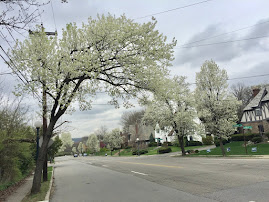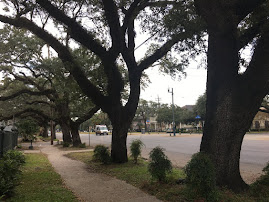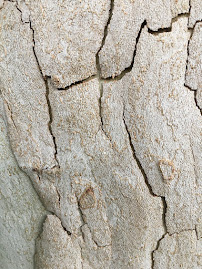Dear George,
Having drifted into a state of total lethargy, I haven’t checked the I Ching even once since the pandemic began. That’s ridiculous. The I Ching, of course, is the ancient Chinese Book of Changes. Drawing from Confucianism and Buddhism, it provides guidance for moral decision-making and action. One typically consults the I Ching by asking a question and then tossing three coins six times in a row. The pattern of heads and tails for each coin toss results in either a solid or broken line (see citations at the end for details), and the six lines are arranged vertically in a stacked hexagram as in this example:
Hexagram 43: Kuai - Breakthrough (Resoluteness)
Each possible hexagram, subdivided into an upper trigram and a lower trigram, represents a specific life situation. With six coin tosses, there are 8 trigrams possible and 64 (8 x 8) hexagrams possible. The 8 trigrams represent heaven, lake, fire, thunder, wind, water, mountain, and earth. The I Ching provides an interpretation for each of the 64 hexagrams. Each interpretation includes an Image (the state of mind a superior man would adapt under the circumstances) and a Judgement (the best strategy for action under the circumstances).
I asked the I Ching, “How can I best cope with the pandemic?” Like Michelle Obama, I find myself increasingly experiencing “low-grade depression”. Most of our major pleasures in life have been closed off, and I wake each morning with a sense of dread and an expectation that there is nothing to look forward to. I tossed the coins six times and recorded each solid and broken line. My hexagram (shown above) is titled Kuai (Breakthrough [Resoluteness]). The upper trigram is Tui (The Joyous, The Lake), and the lower trigram is Ch’ien (The Creative, Heaven). The hexagram suggests that the lake has evaporated and ascended to the sky where it will discharge itself as a cloudburst, hence the imagery of a breakthrough.
Richard Wilhelm’s commentary. In the most highly regarded rendition of the I Ching, translator Richard Wilhelm writes: “This hexagram signifies on the one hand a break-through after a long accumulation of tension, as a swollen river breaks through its dikes, or in the manner of a cloudburst. On the other hand, applied to human conditions, it refers to the time when inferior people gradually begin to disappear. Their influence is on the wane; as a result of resolute action, a change in conditions occurs, a break-through. The hexagram is linked with the third month (April-May).”
My comments. As usual, the I Ching is uncannily on target. April-May, of course, is when the coronavirus’s major surge began in the U.S., including a sharp increase in hospitalizations and deaths, shelter in place mandates, the prohibition of large public gatherings, and the closing of restaurants, bars, and many retail establishments. Like most people, I’ve experienced more and more tension since that time, and my mode of coping, frankly, has been that of an “inferior person”. Morose, passive, self-pitying, hopeless.
How can one break through the paralyzing funk that the pandemic produces? First, it’s helpful to recognize that there are wide differences in how people respond to the situation and that depression isn’t an inevitable alternative. Many people, of course, experience catastrophic personal losses — of loved ones, of jobs and income, of their businesses or families. People in our age group are likely to feel particularly vulnerable to the virus and may fear the prospect of an imminent death. At the opposite extreme, some regard the pandemic as a complete hoax and adopt a far more cavalier attitude. Or persons may not let themselves be overwhelmed by the situation. In occasional instances, the pandemic provides a desirable opportunity for financial profit (e.g., pharmaceutical companies). Likewise, there are divergent ways of viewing the pandemic. Probably a majority dwell on the fact that 1 of 60 Americans have been infected by the virus, while others are reassured that 59 of 60 haven’t been. Experts estimate that 1% or fewer of infected persons are likely to die (though, on the other hand, 99% or more will not).
It seems to me that two things are required for a breakthrough. The first is to adopt a less exaggerated and more realistic view of the pandemic. I spend endless hours soaking in frightening information from the media (which concentrates almost entirely on death rates and largely ignores rates of recovery). In looking at relevant statistics, our odds, in fact, are pretty good. Second, I think a breakthrough occurs which one engages in meaningful, rewarding activities that provide a renewed sense of mission. Something beyond watching Netflix and taking naps. A lot of my own gloomy state is linked to the loss of so many activities in our community. I have lost my poetry classes, but I can still write tons of poems. The gym has been shut down, but I can do a challenging exercise program at home. The same for blogging, reading, art, music, photography, and playing cards and Trivial Pursuit with Katja. I’ve been a slug-a-bed for much too long. Hopefully finishing this blog post will be the first step in a personal breakthrough. Time will tell.
Love,
Dave
SOURCES:
Wilhelm, Richard. (1950). The I Ching or Book of Changes. Cary Baynes, trans. Bollingen Series 19. Introduction by Carl G. Jung. New York: Pantheon Books. 3rd edition (1967), Princeton: Princeton University Press.
mindsports.ni, “Interpreting the I Ching”
taopage.org, “Content of the I-ching”
the-iching.com, “43. Parting (guài). Breakthrough”




















































































































































